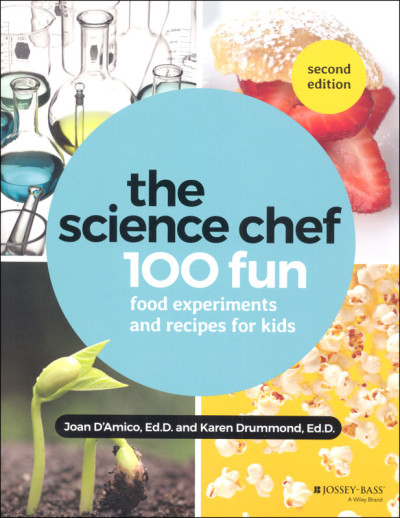We use cookies to make your experience better. To comply with the new e-Privacy directive, we need to ask for your consent to set the cookies. Learn more.
Science Chef: 100 Fun Food Experiments and Recipes for Kids, 2nd ed.
If your kids enjoy cooking, why not bring some science into the kitchen? The Science Chef features 100 fun recipes to try as well as kitchen experiments that answer burning questions such as "Why does popcorn pop?" "Why does toast turn brown?" "How do sauces thicken?" and "What happens when you beat egg whites?" Part 1 is organized into nine chapters focusing on one of these topics. Each chapter begins with an experiment. The experiment includes a list of materials, step-by-step instructions, prompts to record observations in a separate notebook and then a follow-up explanation. After the experiment, several related recipes are provided. Part 2 of the book features chapters on making your own food instead of buying pre-made options, including salad dressing, jam, fermented foods, smoothies and more. These sections each start with an experiment as well and include a nice variety of recipes after the experiment. Now in its second edition, some recipes in this book have been updated (I noticed there is now a recipe for air fryer French fries!), there are plenty of helpful photos, and the beginning of the book provides kitchen safety information, nutritional informational and other helpful tips. 250 pages, paperback. - Jess
Break out your best aprons and spatulas: The Science Chef: 100 Fun Food Experiments and Recipes for Kids, 2nd Edition teaches children the basics of science through a variety of fun experiments, activities, and recipes. Each chapter explores a different science topic by giving you an experiment or activity you can do right in your kitchen, followed by easy-to-make recipes using ingredients from the experiment. Altogether there are over 100 experiments, activities, and recipes for you to try. From learning why an onion makes you cry to how to bake the perfect cupcake, you'll bring the fundamentals of science to life in a new, magical way.
The Science Chef covers a wide variety of scientific areas, like:
- How plants grow and produce seeds
- How the process of fermentation produces pickles
- The basics of nutrition
- How acids and bases react together to make baked items rise up in the oven
While the first edition of this classic book has delighted readers for over twenty years, this new edition is sure to be an even bigger hit with the kids in your home. Bon Appetit!
| Product Format: | Softcover Book |
|---|---|
| Brand: | John Wiley & Sons |
| Grades: | 3-9 |
| ISBN: | 9781119608301 |
| Length in Inches: | 10.875 |
| Width in Inches: | 8.5 |
| Height in Inches: | 0.5 |
| Weight in Pounds: | 1.7 |

